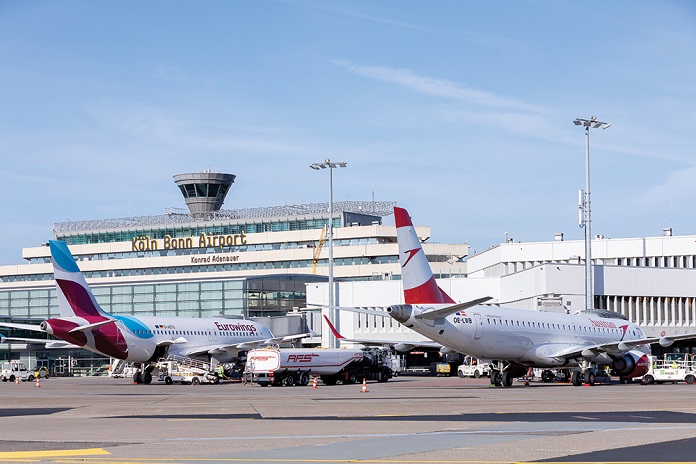
Cologne Bonn Airport was able to finish the 2022 financial year on an extremely positive note, despite many industry-wide challenges. With an after-tax profit of 17.2 million euros, the company recorded its best earnings of the 2000s. “We owe our very successful economic developments to our business model, which consists of two central pillars: passenger traffic, which recovered faster than expected last year in Cologne Bonn, and cargo, which we were able to stabilise at a very high level”, says Thilo Schmid, CEO of Flughafen Köln/Bonn GmbH. “The good result is a credit to all the employees who did an outstanding job despite all the difficulties of the past year”, Schmid adds. “The profit enables us to make important investments in things like climate protection and sustainability, and to further develop the airport.”
2022 saw the airport return to the profit zone after pandemic-ridden years, having recorded a loss of 14.5 million euros in 2021. Sales revenue in 2022 rose by around 70 million to 317.4 million euros (2021: 246.3 million euros), and, at 73.7 million euros, the company more than doubled its previous year’s EBITDA (2021: 32.6 million euros). “The rapid recovery in passenger traffic and the ongoing success in the cargo business played a significant role in the results. We also operated very cost-consciously and increased revenue in many areas”, says director Torsten Schrank. “We were able to bounce back quickly from the crisis years and are doing very well financially, even compared to other industry competitors”, Schrank adds.
But 2022 also had its challenges, which posed difficulties even for air transportation. In addition to the Russian war of aggression in Ukraine, these difficulties particularly included inflation, the energy crisis and staffing shortages. Furthermore, the industry – and therefore also the airport – had to deal with disrupted passenger-handling processes as everything quickly fired back up following the easing of pandemic restrictions. At Cologne Bonn, the first part of the summer often saw long waits at security checkpoints. 2022 also showed how much of a yearning people have to travel.
Passenger traffic recovering, cargo going strong
Passenger traffic recovered quicker than expected after the new Omicron variant made for a modest first quarter. A total of 8.8 million passengers used the airport last year – more than twice as many as in 2021 (4.3 million). This positive development was mainly driven by holiday and “family & friends” traffic, to destinations such as Turkey and Spain among others. “We’re delighted that this clear recovery trend is continuing this year too”, says Schmid. Despite several warning strikes affecting some 100,000 passengers, passenger volumes during the first third of the year were, in many cases, much higher than in 2022. Passenger numbers will increase in the summer, continuing to approach pre-pandemic levels.
On some days, it will even exceed 2019 levels. Some 25 airlines will be flying to 110 destinations in more than 30 countries this summer. The airport is expecting around 9.7 million passengers in 2023 (+11%). Even in 2022, cargo remained stable at a very high level of 971,000 tonnes (2021: 986,000 t), the slight decrease the result of the difficult political situation globally. In 2023, the airport anticipates a slight gain (+2%) with 985,000 tonnes.
Measures package for stable processes and passenger convenience
For the tourist season, the airport has invested in optimising processes and other services for passengers, putting together an extensive package of measures worth some 10 million euros. This package played a significant role in the smooth processes at terminals and on the ramp during the Easter holidays. These measures include starting up the Airport Operations Control Center (AOCC), where all central operational processes have been controlled in co-operation with process partners since mid-March. The airport also now has more digital services for travellers, such as additional automatic bag-drop stations and info kiosks.
The central passport control and area directly in front of the security checkpoint have also been redesigned and optimised. Other measures include a number of new appointments and additional expertise in aircraft handling and baggage services. “As an airport, we have taken lots of measures to make the travel experience at Cologne Bonn as pleasant as possible for our passengers”, says Schmid. “To do this, we are working closely with all our process partners.”
New Duty Free shops opening in June
Operations are also in full-swing in the non-aviation side of things. New Duty Free operator Setur, for example, is working to open shops in Terminals 1 and 2 in June. Work has also commenced on implementing the new airport-experience concept for Terminal 2, where the Rhine will be used as a visual theme, new seating will be installed, and seamless transitions will be created between individual areas. Shops at the terminals were already (re)opening at the end of 2022. “We’re implementing a number of concepts to further improve the travel experience for our passengers at the terminals”, says Schrank.
A focus on sustainability and employer appeal
The airport continues to progress with its sustainability activities, recently starting construction on new photovoltaic systems on the roofs of various buildings at the site. This will see around 8,600 new solar modules providing an additional installed output of 2.6 megawatt peak by 2024. The airport is also continuing to replace its lighting, converting to efficient, low-maintenance LEDs – as currently already visible in the modifications being made at Terminal 2 and Parking Building 3. It is investing more than 4.5 million euros in these three projects. “This strategic task is a central element to ensure we are seen as an attractive employer even in future”, Schmid adds. Another way the airport is retaining employees and fostering talent is through its respectful corporate culture and modern work prospects. “In doing so, we are laying the foundations for tackling tasks, both present and future, with a strong team”, says Schmid.










